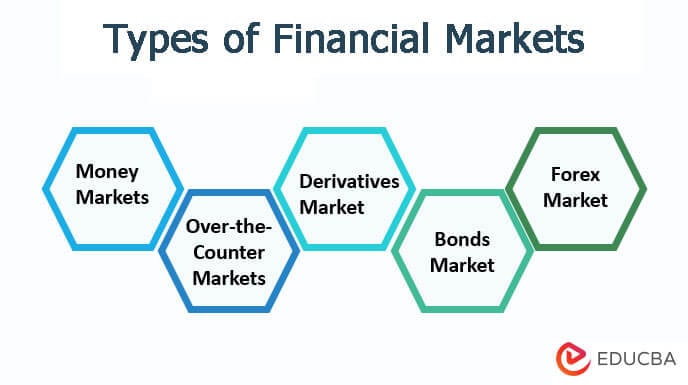
Definition of Financial Markets
Financial Market is a marketplace where financial asset creation and trading occur. Financial assets include shares, bonds, derivatives, commodities, currencies, etc.
The financial market of any country plays a crucial role in allocating the limited resources available within its economy. Some financial markets are very small, with minimal activity, while others trade trillions of securities daily. It acts as an intermediary between savers and investors by mobilizing funds between them. The financial market provides buyers and sellers with a platform to trade assets at prices determined by market forces, namely demand and supply.
Characteristics of Financial Market
- The essential function of a financial market is to connect investors and borrowers. Thus, it links the two, and the market earns some commission for providing the bridge. They ensure transactions are smooth.
- The trust of the investors drives the financial markets. Hence, the regulation of financial markets ensures that investors are always protected. It is governed by rules & regulations that differ for each market.
- Financial intermediaries include banks, NBFCs, stock exchanges, mutual funds, insurance companies, brokers, and other financial institutions. These facilitate the trade between the parties.
- It is readily available for both parties. However, the timing of each financial market varies according to its type.
- It encompasses both marketable and non-marketable securities. Investors trade non-marketable securities, such as fixed deposits in banks, post office investments, or private loans, over the counter (OTC) rather than on an exchange. On the other hand, marketable securities such as stocks and bonds are traded over an exchange.
- Investors may have short-term, medium-term, or long-term perceptions. Therefore, if a financial market can meet the needs of all types of investors, it is considered effective.
- Additionally, the financial market should be effective enough to reward investors based on the risks they assume.
Functions of Financial Market
- It functions as an intermediary between the investor and the borrower. It ensures that trades occur smoothly.
- It mobilizes the personal savings of individuals into the productive means of the financial market. For example, an individual may earn 2% to 3% in a bank account. The individual may earn a rise in share price if they invest the funds in the financial market in the right stock.
- It aids in providing liquidity to stocks & other financial assets.
- Due to availability outside of business hours, trades can be made at any time.
- Since it links both parties to the contract, it saves them time and costs.
- The index for each financial market serves as a benchmark for the growth of the sectors within the economy.
- It allows the demand and supply forces to decide the price of financial securities.
Types of Financial Markets
There are different types of financial markets, which are as follows:
1. Money Markets
A money market is essentially for short-term financial assets that can be turned over rapidly at minimal cost, and instruments are quickly convertible into money with the least transaction costs. In the money market, participants engage in operations extending up to one year and trading short-term financial assets. This market is an institutional source of working capital for companies. These market participants include commercial banks, the RBI, large Corporations, and others. The instruments in the money market are commercial bills, commercial paper, certificates of deposit, and treasury bills.
2. Over-the-Counter Markets
This market is decentralized, not centralized, with no physical location. It is the secondary market. Here, participants in the market trade with each other using various modes of communication, such as electronic means and telephone. Companies traded in the OTC market are typically small. This market has less transparency, fewer regulations, and is inexpensive.
3. Derivatives Market
The derivatives market is a financial market that trades in securities whose value is derived from a specified underlying asset. Derivatives do not have a physical existence, but they emerge from contracts between two parties. These underlying assets may include debentures, shares, currencies, and other similar securities. The market price of an underlying item determines the derivative contracts’ value. This market trades in derivatives, including futures, forward contracts, swaps, and options.
4. Bond Market
The bond is a debt security where an investor lends money for a specific period at a fixed coupon rate, i.e., an actual interest rate. These bonds include Corporate Bonds and municipal bonds from all over the world. The United States Treasury sells all kinds of securities, such as bills and notes, in the bond market.
5. Forex Market
The foreign exchange (forex) market is not a physical entity, but rather a communication network among banks, brokers, and dealers. This is the market where various currencies are traded. It is the highest liquid market, as cash is considered the most liquid asset. It includes market dealings such as the spot market and forward market, among others.
Example of Financial Markets
For example, Company XYZ Ltd. aims to raise $100,000 in capital by issuing equity on the financial market. The company will issue the shares in the primary share market for the first time to the general public, offering new stock issues initially. Any subsequent trading in the stock securities will happen in the secondary market.
Advantages and Disadvantages
Some of the advantages and disadvantages of the financial markets are as follows:
Advantages
- It provides a platform for buyers and sellers to meet and trade assets. The prices for trading are determined by the market forces, i.e., demand and supply. It helps in determining the costs of securities.
- It helps mobilize the investors’ savings as the investor can put their money to the most productive use.
- For traders, the financial market platform provides access to potential buyers and sellers of their securities, helping them save time and money in finding suitable counterparties.
- In the financial market, investors can sell their securities readily and convert them into cash, thereby providing liquidity to the tradable assets.
Disadvantages
- Prices in the financial market may not indicate a stock’s true intrinsic value because of some macroeconomic forces, such as taxes.
- Certain factors change the prices of securities suddenly. So there is a risk involved when trading in the financial market. If any negative news about the company emerges, its price may decrease significantly, resulting in a loss for the person holding its shares.
Important Points of Financial Markets
- The market, an arrangement, or an institution facilitates the exchange of financial instruments and securities.
- It may or may not have a physical location. The assets can be exchanged between the parties via phone or the Internet.
- Some financial markets are very small, with little activity, while others trade trillions of securities daily.
Analysis of the Financial Market
- The primary job of financial markets is to ensure the smooth flow of funds between various parties. An investor should quickly get to know the borrower and vice versa. It increases the transparency of the information and forms a basis for efficient market prices.
- The investments from corporations and savings from households flow in a stream to help the economy rise. This helps increase the production of goods & supply of services.
- Finance is the basis of an efficient economy. A financial market is the backbone of a country’s GDP increase.
- An increase in the financial market size implies an increase in the potential of corporations and households. Consequently, the country’s future economic growth is reflected in its GDP, which demonstrates expansion.
Final Thoughts
To conclude, Traders actively buy and sell financial assets, such as shares, bonds, derivatives, commodities, and currencies, making the financial market their marketplace. It is an arrangement or institution that facilitates the exchange of financial instruments and securities. It may or may not have a physical location. The assets can be exchanged over the phone or the Internet between parties. Over the last few years, the role of the financial market has undergone a drastic change due to several factors, including low transaction costs, investor protection, high liquidity, transparent pricing information, streamlined legal procedures, and ease of settling disputes.
Recommended Articles
This is a guide to Financial Markets. Here we discuss the types, examples, advantages, and disadvantages of the financial market, along with the important points. You can also go through our other suggested articles to learn more –

